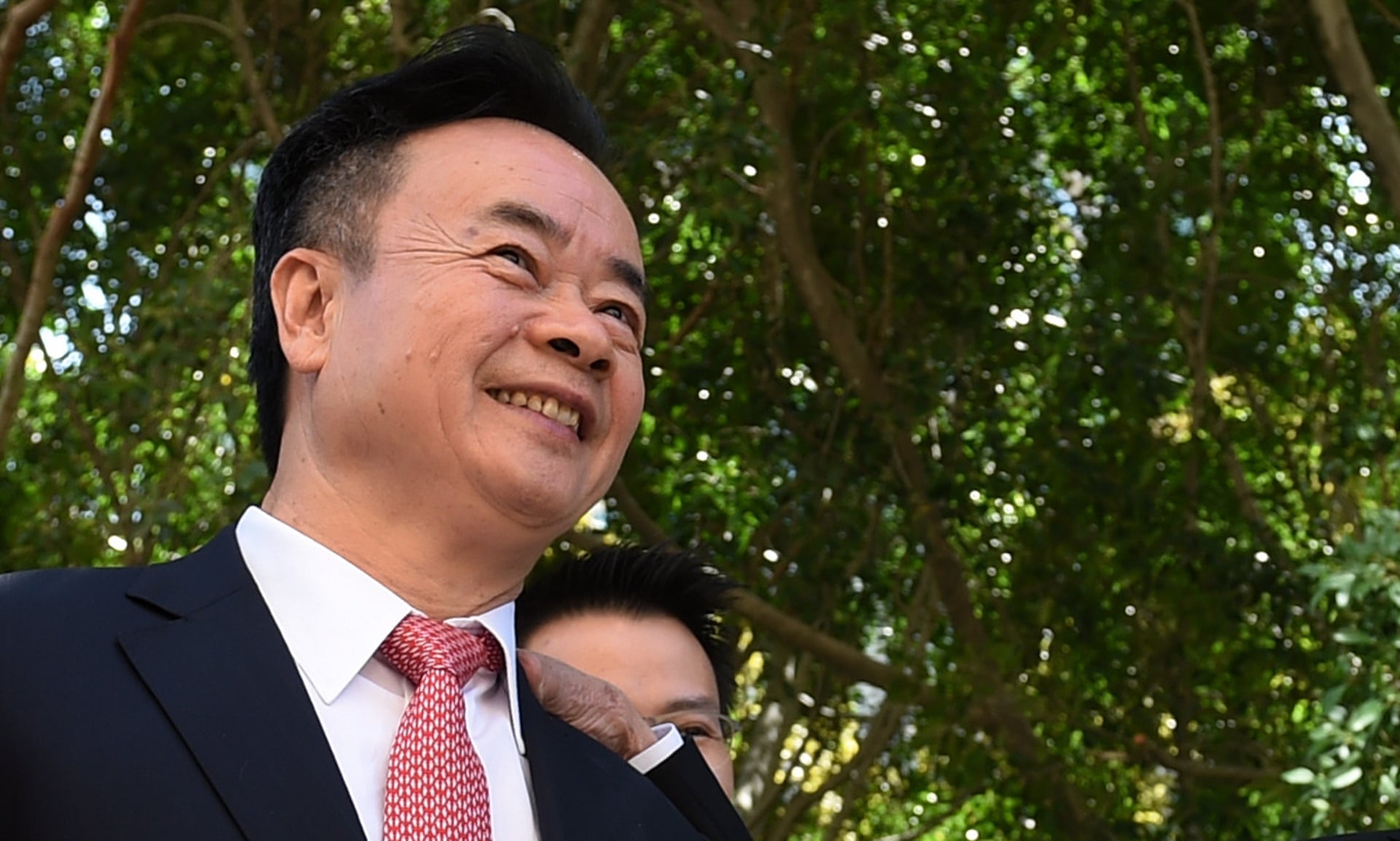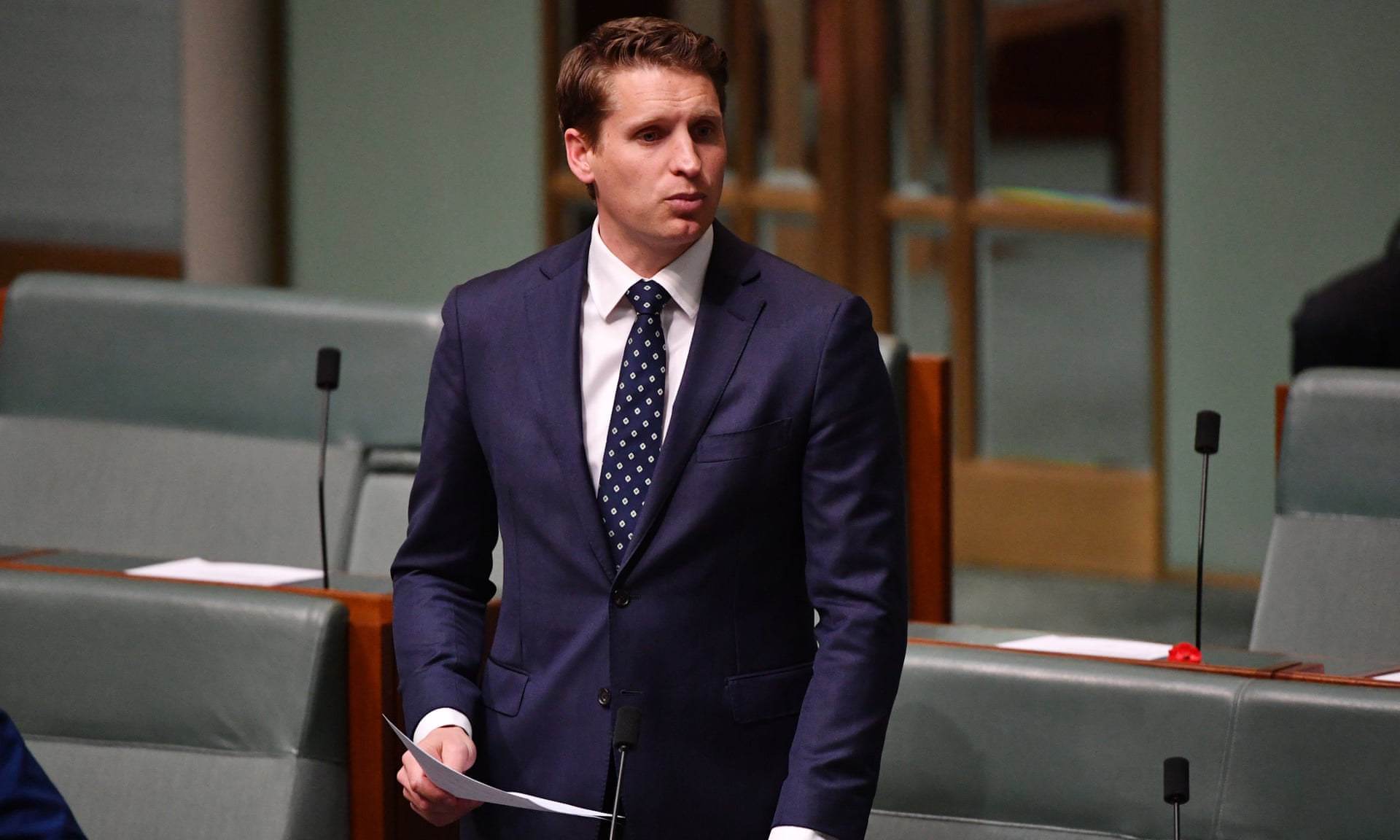By Amy Remeikis and Katharine Murphy
Chau Chak Wing at the opening of the Chau Chak Wing building at the University of Technology, Sydney.
The chair of Australia’s intelligence and security committee has taken the extraordinary step of using parliamentary privilege to identify one of Australia’s biggest political donors of conspiring to bribe one of the United Nation’s top diplomats.
Andrew Hastie used a speech in the parliament’s Federation Chamber to identify Chinese-Australian billionaire Chau Chak Wing, as “co-conspirator 3” in a 2015 American bribery case, which alleged John Ashe, the former president of the United Nations General Assembly, had been paid to assist in the smooth progress of business deals.
Hastie said he confirmed Chau’s identity while leading a delegation to the United States to discuss Australia’s foreign interference and espinage laws, as the chair of the parliamentary intelligence and security committee and believed it his “duty” to share what he had learnt.
“During discussions with United States authorities I confirmed the long suspected identity of CC3,” he said.
“It is now my duty to inform the house and the Australian people [that person] is Chau Chak Wing. The same man who co-conspired to bribe the UN president of the general assembly, John Ashe. The same man with extensive contacts in the Chinese Communist Party, including the United Front.
“I share it with the House because I believe it to be in the national interest. My duty first and foremost is to the Australian people and the preservation to the ideals of the democratic traditions of our Commonwealth.”
Hastie’s explosive statements in the Federation Chamber comes at a time when the Turnbull government has been attempting to calm diplomatic tensions between Canberra and Beijing prompted by the Coalition’s foreign interference laws.
With relations between Canberra and Beijing tense, the trade minister Steve Ciobo has travelled to China, and the foreign minister Julie Bishop held a lengthy meeting with her Chinese counterpart, Wang Yi, on the sidelines of the meeting of G20 foreign ministers in Argentina.
Bishop characterised the bilateral discussion with Yi as “very warm and candid and constructive” and said she would shortly visit the Chinese capital.
Her Chinese counterpart was cooler.
Andrew Hastie in parliament on Tuesday.
Hastie, a Western Australian conservative, told the chamber on Tuesday night he was naming Chau to ensure Australia’s democracy – and free press – could operate without interference.
“CC3 is a Chinese-Australian citizen. He has also been a very significant donor to both of our major political parties,” he said.
“He has given more than $4m since 2004. He has also donated $45m to universities in Australia. The Australian press has reported these matters and others and have been sued for defamation by CC3.
“CC3 disputes a number of the reported allegations.
“The merits of these defamation cases are appropriately left for a court.
The chair of Australia’s intelligence and security committee has taken the extraordinary step of using parliamentary privilege to identify one of Australia’s biggest political donors of conspiring to bribe one of the United Nation’s top diplomats.
Andrew Hastie used a speech in the parliament’s Federation Chamber to identify Chinese-Australian billionaire Chau Chak Wing, as “co-conspirator 3” in a 2015 American bribery case, which alleged John Ashe, the former president of the United Nations General Assembly, had been paid to assist in the smooth progress of business deals.
Hastie said he confirmed Chau’s identity while leading a delegation to the United States to discuss Australia’s foreign interference and espinage laws, as the chair of the parliamentary intelligence and security committee and believed it his “duty” to share what he had learnt.
“During discussions with United States authorities I confirmed the long suspected identity of CC3,” he said.
“It is now my duty to inform the house and the Australian people [that person] is Chau Chak Wing. The same man who co-conspired to bribe the UN president of the general assembly, John Ashe. The same man with extensive contacts in the Chinese Communist Party, including the United Front.
“I share it with the House because I believe it to be in the national interest. My duty first and foremost is to the Australian people and the preservation to the ideals of the democratic traditions of our Commonwealth.”
Hastie’s explosive statements in the Federation Chamber comes at a time when the Turnbull government has been attempting to calm diplomatic tensions between Canberra and Beijing prompted by the Coalition’s foreign interference laws.
With relations between Canberra and Beijing tense, the trade minister Steve Ciobo has travelled to China, and the foreign minister Julie Bishop held a lengthy meeting with her Chinese counterpart, Wang Yi, on the sidelines of the meeting of G20 foreign ministers in Argentina.
Bishop characterised the bilateral discussion with Yi as “very warm and candid and constructive” and said she would shortly visit the Chinese capital.
Her Chinese counterpart was cooler.
In a translated press statement after the G20 talks, the Chinese foreign minister Wang Yi acknowledged China-Australia relations had “encountered some difficulties”.
He also urged Australia to adopt a more positive disposition towards Beijing.
He also urged Australia to adopt a more positive disposition towards Beijing.
“If Australia sincerely hopes that the relations between the two countries will return to the right track... they must break away from traditional thinking, take off their coloured glasses, and look at China’s development from a positive angle,” Wang said.
Andrew Hastie in parliament on Tuesday.
Hastie, a Western Australian conservative, told the chamber on Tuesday night he was naming Chau to ensure Australia’s democracy – and free press – could operate without interference.
“CC3 is a Chinese-Australian citizen. He has also been a very significant donor to both of our major political parties,” he said.
“He has given more than $4m since 2004. He has also donated $45m to universities in Australia. The Australian press has reported these matters and others and have been sued for defamation by CC3.
“CC3 disputes a number of the reported allegations.
“The merits of these defamation cases are appropriately left for a court.
“My concern is defamation cases can have a chilling effect on our free press.
“Any attempt to silence our media from our telling the truth, provided it is the truth, through a defamation claim can not stand.
“Our democracy only works if we have a free press which can publish information which serves the public interest.
“We don’t always like what the press writes, but they are essential to a free and flourishing democracy. The Australian people deserve the truth.”
“Any attempt to silence our media from our telling the truth, provided it is the truth, through a defamation claim can not stand.
“Our democracy only works if we have a free press which can publish information which serves the public interest.
“We don’t always like what the press writes, but they are essential to a free and flourishing democracy. The Australian people deserve the truth.”


Aucun commentaire:
Enregistrer un commentaire